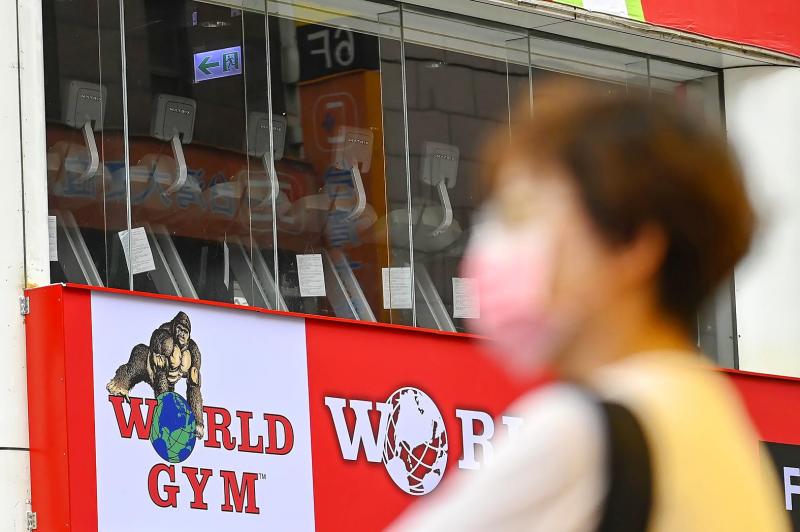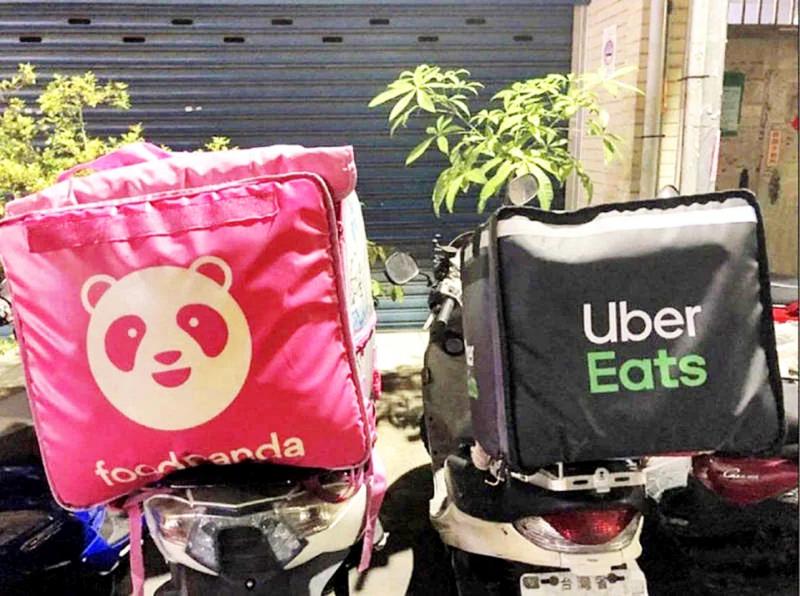Over the weekend, among expatriate circles, a report by the Central News Agency (CNA), which stated that individual foreign residents — unlike Taiwanese citizens — wouldn’t be eligible for one-off cash handouts of NT$3,000 to NT$6,000 if they were encountering financial difficulties as a result of the COVID-19 outbreak, caused some dismay and a good amount of annoyance.
Foreigners who’ve been living and paying taxes in the capital for years felt aggrieved and excluded. And all for no reason, it seems: Tom Chou (周台竹), commissioner of the Taipei Mayor’s Office for External Affairs, on Monday said: “We won’t exclude a foreign individual, so long as he or she pays tax to the central or local government.”
He then qualified his words, mentioning the need to coordinate with and await guidance and regulations from the central government.

Photo: Chen Chih-chu, Taipei Times
SUBSIDIES FOR FOREIGNERS
Taipei Mayor Ko Wen-je’s (柯文哲) plan to shore up the capital’s economy, dubbed the Nine Major Relief Measures (9大紓困措施) includes assistance for local businesses as well as individuals suffering a loss of income.
“A foreigner who has established a company in Taiwan, and who pays taxes to Taipei City Government, such as property taxes or license fees, is eligible to apply for help. They can contact the city’s Department of Finance for details,” Chou said, sounding confident.

Photo: Luo Chi, Taipei Times
Carrie Kellenberger, a former chairwoman of the Canadian Chamber of Commerce in Taiwan who with her husband runs Reach To Teach Recruiting, said: “We’ve been business owners here for over 10 years. We provide good jobs to locals as well as foreign talent, and have worked closely with the government here to provide teachers for education programs. If our business isn’t eligible for any kind of assistance, it’d be just so sad. We’re also trying to assist a lot of teachers who are in crisis right now.”
Marcus (not his real name), an English teacher from South Africa, is among the foreign residents who say they’d really benefit from some official assistance. His employer, the cram school through which he obtained his Alien Resident Certificate, has suspended classes, leaving him without an income.
Speaking to the Taipei Times before Chou had issued his clarification, Marcus said: “I’ve saved some, and my friends are helping, but that subsidy would really have been nice.”
“Basically, I am screwed,” lamented another teacher. “I had three part-time jobs, and they all shut down because the government mandated it.”
He added that his bosses still hadn’t figured out how to do online teaching, even though they’d like to implement it. “Luckily my housemate gave me two months’ rent in advance, but I don’t know what I’m going to do when that runs out,” he said.
According to the CNA report, a city-funded subsidy of up to NT$7,000 for those quarantining, self-isolating, or quarantining with a family member in a hotel also excludes foreigners, even those with residency. However, foreign residents can still apply for a NT$1,000 per day payment from the central government during quarantine.
If the Taipei City Government does as Chou says it will, and provides assistance and subsidies to every qualifying legal resident, citizen or not, it’ll help to break a long-established pattern common to central and local government, in which services are sometimes denied to non-citizens whose tax dollars help pay for those programs.
Last summer, as the Taipei Times reported, some long-term foreign taxpayers expressed consternation when the central government excluded from its Triple Stimulus Voucher Program foreign residents not currently married to local citizens. Four months later, the government relented, and sent out vouchers to holders of Alien Permanent Resident Cards (APRC) who’d missed out first-time around, as well as foreigners with diplomatic identification cards.
Foreigners who live and work in Taiwan and obey the law often find the door closed when it comes to government social programs. The country’s National Health Insurance is greatly appreciated by many non-citizens, but foreigners who’ve obtained permanent residency aren’t eligible for unemployment benefits. That said, foreigners who are dependent spouses of Taiwanese citizens, and who hold joining-family resident visas, do qualify.
HOUSEHOLD REGISTRATION SYSTEM
Because non-citizens are never independently listed on household registration documents, they miss out.
“The household registration system is the basis for many local government benefits, and that structurally disqualifies foreigners from some benefits,” says Michael Fahey, an associate at the Taipei law firm of Winkler Partners who is familiar with these issues.
Taipei City Government offers kindergarten subsidies that foreign children are effectively excluded from because they don’t have and cannot obtain household registration, he points out. For children aged two to four years attending legally-registered private kindergartens in the capital, the subsidy is NT$13,660 per semester, so long as the income of parents or guardians doesn’t exceed a certain amount.
According to Fahey, regulations in New Taipei make it more difficult for parents of non-citizen children to enroll their kids in public kindergartens.
Citizens enjoy definite advantages at the National Palace Museum, which is a unit of the central government.
On weekdays, Taiwanese aged 65 and above can enter for free. On weekdays, they only need to pay NT$75. Taiwanese and APRC holders of any age can buy tickets discounted to NT$150. Foreign tourists and those with non-permanent residency, however long they’ve lived in Taiwan, have to shell out NT$350 to see the treasures of ancient China.
There has been some progress, however. Since November last year, foreigners aged at least 65 with APRCs have been eligible to apply for the same type of EasyCard as local senior citizens. Each card provides 480 points per month which the holder can use to ride the metro, buses or YouBikes, or for admission to swimming pools and city venues.
On its Web site, the European Chamber of Commerce Taiwan described this reform as “a major breakthrough for long-term senior foreign residents of Taipei. It has been achieved thanks to many years of advocacy by the ECCT’s Better Living committees to grant equal treatment to legal foreign residents of Taiwan and the efforts of Taipei City Mayor Ko and officials in the Taipei City Government.”

A vaccine to fight dementia? It turns out there may already be one — shots that prevent painful shingles also appear to protect aging brains. A new study found shingles vaccination cut older adults’ risk of developing dementia over the next seven years by 20 percent. The research, published Wednesday in the journal Nature, is part of growing understanding about how many factors influence brain health as we age — and what we can do about it. “It’s a very robust finding,” said lead researcher Pascal Geldsetzer of Stanford University. And “women seem to benefit more,” important as they’re at higher risk of

Eric Finkelstein is a world record junkie. The American’s Guinness World Records include the largest flag mosaic made from table tennis balls, the longest table tennis serve and eating at the most Michelin-starred restaurants in 24 hours in New York. Many would probably share the opinion of Finkelstein’s sister when talking about his records: “You’re a lunatic.” But that’s not stopping him from his next big feat, and this time he is teaming up with his wife, Taiwanese native Jackie Cheng (鄭佳祺): visit and purchase a

April 7 to April 13 After spending over two years with the Republic of China (ROC) Army, A-Mei (阿美) boarded a ship in April 1947 bound for Taiwan. But instead of walking on board with his comrades, his roughly 5-tonne body was lifted using a cargo net. He wasn’t the only elephant; A-Lan (阿蘭) and A-Pei (阿沛) were also on board. The trio had been through hell since they’d been captured by the Japanese Army in Myanmar to transport supplies during World War II. The pachyderms were seized by the ROC New 1st Army’s 30th Division in January 1945, serving

The People’s Republic of China (PRC) last week offered us a glimpse of the violence it plans against Taiwan, with two days of blockade drills conducted around the nation and live-fire exercises not far away in the East China Sea. The PRC said it had practiced hitting “simulated targets of key ports and energy facilities.” Taiwan confirmed on Thursday that PRC Coast Guard ships were directed by the its Eastern Theater Command, meaning that they are assumed to be military assets in a confrontation. Because of this, the number of assets available to the PRC navy is far, far bigger